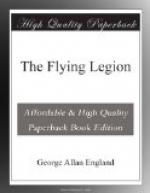Oddly awry she hung, driven slowly eastward by the wind. Her rudder was burned clean off; her stern, warped, reeking with white fumes that drifted on the late afternoon air told of the fury that had blazed about her. Flames no longer roared away; but the teeth of their consuming rage had bitten deep. Where the aft observation pit had been, now only a twisted net of metal-work remained, with all the plate-glass melted and cracked away. The body of Gorlitz, trapped there, had mercifully fallen into the sea. That ghastly thing, at any rate, no longer remained.
Four Legionaries were in the pilot-house: the Master, Bohannan, Leclair, and “Captain Alden.” For the most part, they held silence. There was little for them to say. At length the major spoke.
“Still sagging down, eh?” he commented, his eyes on the needle of the altimeter. “Some situation! Two men dead and others injured. Engines crippled, propellers the same, and two floats so damaged we couldn’t stay on the surface if we came down. Well, by God!”
Leclair looked very grim.
“I regret only,” said he in broken English, “that the stowaway escaped us. Ah, la belle execution, if we had him now!”
The Master, at the starboard window, kept silence. No one sat at the wheel. Of what use could it have been? The Master was looking far to eastward, now with the naked eye, now sweeping the prospect with binoculars. He was studying the African coast, clearly in sight as a long, whitish line of sand with a whiter collar of foamy surf, fifteen miles away.
A few gulls had begun to show—strange, small gulls, yellow-beaked and swift. Off to northward, a native dhow was beating down-wind with full-bellied lateen sail, with matting over its hatches. Heat was beginning to grow intense, for no longer was Nissr making a gale that cooled; no longer was she at high, cold levels. Africa, the tropics, had suddenly become real; and the sudden contrast oppressed them all.
Through the shimmering, quivering air, an arid pallor extended up the eastern sky; a pale, milky illumination, dull-white over the desert, that told of the furnace into which Nissr was drifting—if indeed she could survive till she reached land. The glasses showed tawny reaches of sand, back a little from the coast; and beyond these, low hills, or rather rolling dunes, lay empurpled by vibrant heat-hazes.
“It won’t be much like navigating over that Hell-spot, three or four miles in the air,” muttered Bohannan. He looked infinitely depressed. The way he gnawed at his red mustache showed how misadventure had raveled his nerve.
No one answered him. Leclair lighted a cigarette, and silently squinted at Africa with eyes long inured to the sun of that land of flame. Alden, at the other window, kept silence, too. That masked face could express no emotion; but something in the sag of the woman’s shoulders, the droop of her head, showed how profound and intense was her suffering.




